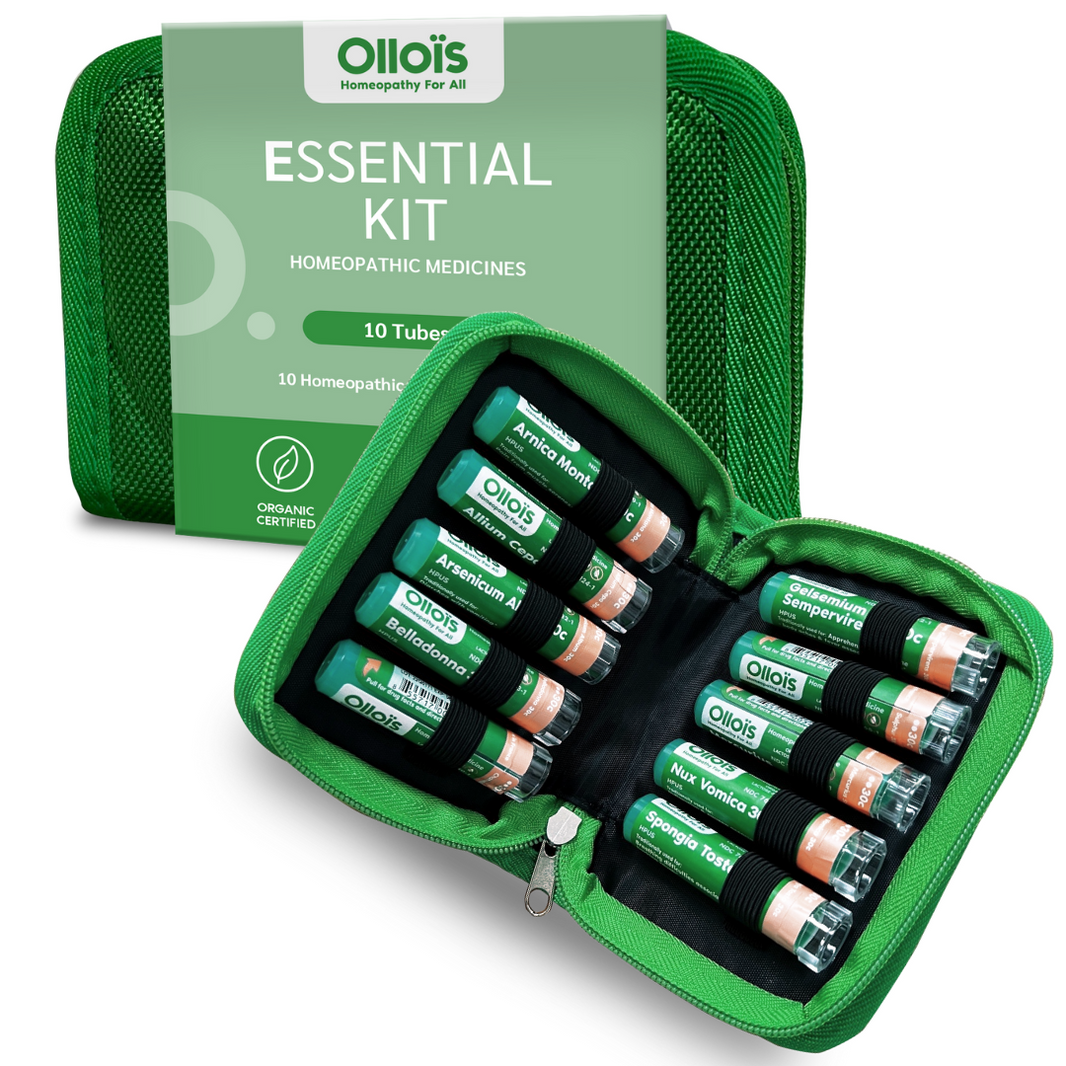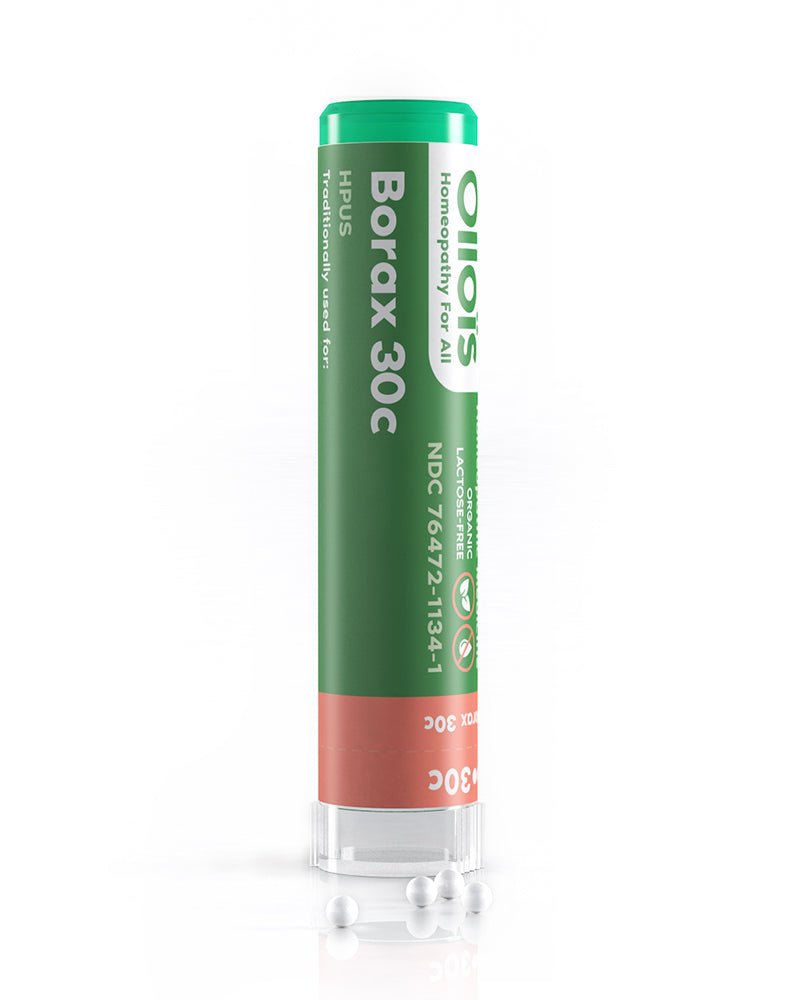Collection: Canker Sores
Homeopathic Essential Kit
Borax
Canker sores are painful lesions inside the mouth – usually found on the inside of the lips, around the gums, or along the side of the tongue. They appear as oval in shape with a white centre. Prior to noticing them visually, most will have felt their stinging or burning sensation.
The cause of canker sources is not universally agreed upon, though there are some common contributors. It appears that the pH level of mouth is a factor. Cankers can be triggered by eating acidic fruits, such as oranges, lemons, or pineapples. These kinds of foods can also amplify the pain of an existing canker. An injury or trauma to the mouth, such as the slip of a toothbrush, can also be a cause. It’s been found that anti-inflammatories like ibuprofen can trigger them and there is also mounting evidence that being under stress can have an effect.
For those who have suffered a canker sore in the past, or have to deal with them frequently, you’ll know how much discomfort a canker sore can cause. Depending on the location of the sore, even talking can be a source of discomfort. In an occupation that requires a great deal of communication, such as talking on the phone or presenting to others, a canker can be a major distraction that’s nearly impossible to ignore and difficult to hide. Eating meals is also uncomfortable – especially if acidic or spicy foods are on the menu.
Thankfully, there are homeopathic remedies for canker sores. Using Borax-30c, a product available from Olloïs, will provide you with natural relief. This treatment will help dull the pain of the sores, relieving the uncomfortable symptoms quickly and effectively.
Discover Olloïs’ lineup of 100%-natural homeopathic remedies that can help alleviate common conditions like canker sores.
FAQ
What is Homeopathy?
Homeopathy is a medical practice based upon the body's ability to heal itself, and the principle that "like cures like" or the Law of Similars: that is, if a natural substance causes a symptom in a healthy person, a very small amount of the same substance may help relieve symptoms of the illness. Homeopathic medicines enhance the body's normal healing and self-regulatory process.
How do I take homeopathic medicines?
Homeopathic medicated pellets contain only a little of an active ingredient for treatment of disease. These are known as highly diluted or "potentiated" substances. Homeopathic medicines should be placed under the tongue of adults and children or in the cheek of an infant, where they will dissolve. It is preferable to take homeopathic medicines apart from meals. The dosage is not related to the weight and age of the patient. In general, dissolve 5 pellets 3 times a day until symptoms are relieved or as directed by your health Care Professional.
Is there evidence that Homeopathy works?
There are literally hundreds of high quality, published basic sciences, pre-clinical and clinical studies showing that homeopathy works. These studies have been published in respected journals like Lancet, Pediatrics, Rheumatology, and Annals of Internal Medicine, among others.
A great source of high quality research in homeopathy at an
international level is the Homeopathic Research Institute in the U.K. headed by physicist, Dr Alexander Tournier. Click below to learn more about their studies and rigorous methods.
Is Homeopathy regulated?
The U.S. Congress passed a law in 1938 declaring that homeopathic remedies are to be regulated by the U.S. Food and Drug Administration (FDA) in the same manner as nonprescription, over the counter (OTC) drugs.
Is Homeopathy new?
The Law of Similars has been known since at least the time of Hippocrates (ca. 400 B.C.), but it was doctor and chemist Samuel Hahnemann who fully stated the ideas of homeopathy in the early 1800's in Germany. He discovered the truth of the Law of Similars by testing small doses of medicine on himself. Although there is wider acceptance of homeopathy in countries such as France, Germany, Mexico, Argentina, India and Great Britain, we have seen a greater interest in homeopathic medicine in the USA recently. In fact, the family doctor to England's Queen Elizabeth is a homeopathic physician.
What is the difference between the dilutions?
30C dilutions are traditionally used in Homeopathy to address general and chronic symptoms.
200CK dilutions are usually recommended by healthcare practitioners when there is an emotional component associated with physical symptoms.
Which base ingredient do you use for your pellets?
Our pellets are made from Organic Beet Sucrose exclusively grown in Europe. We then impregnate the pellets with the homeopathic dilution of the remedy.
How to open our tubes?
Are Olloïs remedies HAS/FSA eligible?
Yes, Olloïs homeopathic remedies are eligible.

 Respiratory
Respiratory
 Stress & Sleep
Stress & Sleep

